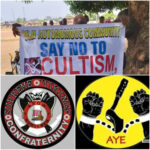-by Daniel Banjo, a security expert and foremost public affairs evaluator.
History:
February 2014: The Jihadist group raided the Nigerian village of Izghe in the north of the country and murdered dozens – before going door-to-door and killing anyone they came across.
April 2014: Nearly 300 schoolgirls are abducted from the town of Chibok, which Boko Haram burned to the ground.
August 2014: The terror group kidnapped at least 97 people during raids on villages in Borno State. They killed 28 boys and men.
November 2014: 120 people killed in a bomb attack on a central Mosque in Kano – the principal city of northern Nigeria.
January 4, 2015: Boko Haram kidnaps 40 boys and young men, believed to be aged ten to 23, from a village in the Nigerian state of Borno.
Above depicts the security situation in the general north east area which had led the introduction of military personnel to combat the deadly activities of the terrorist group since 2009.
Inconsistency:
It became bothersome when I read all sorts of utterances emanating from the ‘peoples’ of Borno state and I continue to wonder why this set of humans remain so inconsistent in agitations and hypocritical in attitudes.
Before:
As far back as 2011, they had been at loggerheads with the government on the issue of the Boko Haram group, at a period requesting that troops of the NA be withdrawn and a dialogue system pursued. Read below a report of a publication in 2011. This agitation probably led to the then government resorting to the use of mercenaries. Unfortunately, apart from the huge monies expended on the project, the situation worsened. Now, they are at it again.
‘As the security situation in Borno State deteriorates, a Committee of Elders and Leaders of Thought has joined the various appeals on the Federal Government to immediately withdraw armed soldiers from the streets of Maiduguri and environs.
In the press statement, dated 12 July 2011, the Committee accused the soldiers of arson, murder, looting and raping of young girls.
It described as “grossly misplaced and shuttered,” the government’s calculation that the intervention of the military in the conflict might bring the situation under control.
The Committee said that the presence of thousands of weapon brandishing soldiers on the streets of Maiduguri has turned the situation into the worst nightmare Maiduguri has ever seen, with the soldiers shooting and killing hundreds of youth for no reason other than that they are young people.

The Committee also had a message for the Boko Haram militants. “We call on the members of the Ahlus Sunnah lid da’awati wal jihaad (Yaanaa) to please see the current human suffering of fellow Muslims and look for alternative ways of pursuing their demand.”
It also asked the government to go into “honest and positive dialogue” with the militants as they have already made their demands public’ – by Saharareporters, New York, Jul 14, 2011
Now:
It is the same elders that called for the withdrawal of Soldiers due to unethical practices in 2011 that had accused the army in 2018 of check points malpractices; in 2019 alleged attack on the governor’s convoy that are now shouting there are not enough Soldiers in the NE, thereby demanding for mercenaries. Was it mercenaries that liberated their towns from Boko Haram? Was it private military contractors that brought them home from IDP Camps or was it their local youths that protected them at the camps. This just goes to show how inconsistent and unappreciative people are.
The difference in the security situation between 2011 and now is crystal clear however during the period, these people had not stopped agitating for one thing or the other in their efforts not to appreciate the government. Of recent, they are known to have bellowed the insufficiency of the troops within their towns expecting soldiers to be deployed at everyone’s backyard. Their grouses, thus associated, had always been targeted at the army rather than the civil authorities and security agencies constitutionally responsible for such civil duties.
Rather than appreciating the military and government of PMB for creating a better environment for returning them home from their various IDP Camps, they portray an ungrateful nature, never repenting in their hypocrisy. In actual fact, it is the submission of a research that their attitude may be a tactical effort to demoralise the fighting troops while psychologically supporting the insurgents. It concluded that until a change in attitude is visibly displayed and noted by military authorities, the activities of the multinational terrorist groups may continue in this axis for a long time.









Comment here